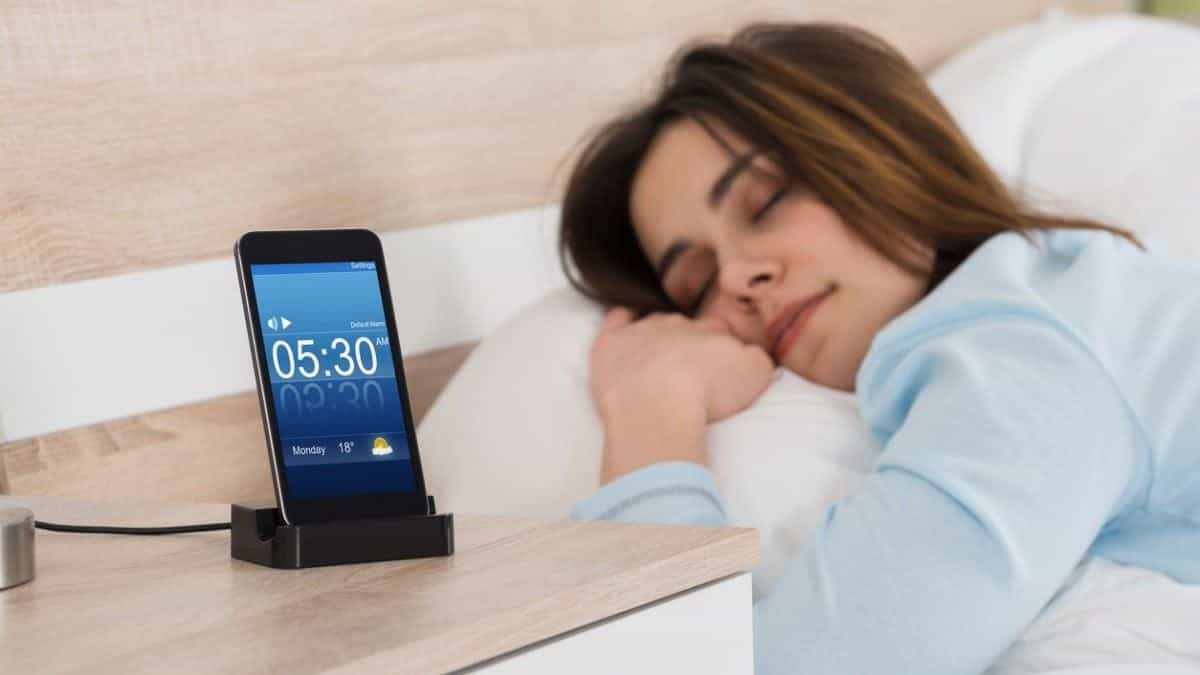Show table of content Hide table of content
In today’s digital age, smartphones have become an integral part of our lives. Many people rely on these devices for various functions, including as an alarm clock to wake up in the morning. However, sleep experts are sounding the alarm on this common habit, warning that using your smartphone as a wake-up call could be detrimental to your health and well-being. Let’s explore why this seemingly convenient practice might be doing more harm than good.
The hidden dangers of smartphone alarms
While smartphones offer a convenient way to set alarms, they come with hidden risks that can negatively impact our sleep quality and overall health. Dr. Shalini Paruthi, a sleep specialist at Saint Louis Hospital, emphasizes the importance of keeping smartphones out of the bedroom. The temptation to use our devices before bed or during sleepless nights can lead to significant sleep disturbances.
One major issue is the blue light emitted by smartphone screens. This type of light suppresses the production of melatonin, a hormone crucial for regulating our sleep-wake cycle. As a result, using your phone before bed can make it harder to fall asleep and reduce the quality of your rest. Additionally, the constant notifications and alerts from your device can disrupt your sleep throughout the night, even if you’re not actively using it.
Well-being Here’s the real distance you need to walk every day to get back in shape
Moreover, the ease of accessing social media, emails, or other stimulating content on smartphones can lead to prolonged screen time and increased cognitive arousal, making it difficult for your mind to wind down and prepare for sleep. This habit can create a cycle of poor sleep quality and daytime fatigue, ultimately affecting your productivity and overall well-being.
The snooze button: a sleep saboteur
Another problematic feature of smartphone alarms is the infamous “snooze” function. While it may seem like a blessing for those who struggle to wake up, sleep experts warn against its use. Dr. Joseph Dzierzewski, a researcher at the National Sleep Foundation, explains that those extra five or ten minutes of sleep after hitting snooze have little to no positive impact on your alertness or energy levels.
In fact, repeatedly hitting the snooze button can disrupt your natural sleep cycles, leading to a phenomenon known as “sleep inertia.” This state of grogginess and disorientation can persist for hours after waking, affecting your cognitive performance and mood throughout the day. Instead of relying on the snooze function, experts recommend getting up as soon as your alarm goes off, even if you feel tired.
The convenience of smartphone alarms can also lead to inconsistent sleep schedules. With the ability to easily adjust wake-up times, people may be more likely to stay up later or sleep in on weekends, disrupting their body’s natural circadian rhythm. This inconsistency can make it harder to fall asleep and wake up at regular times, further compromising sleep quality.
Well-being This simple test requires only a spoon to determine if you’re sleep-deprived.
Creating a sleep-friendly environment
To improve your sleep quality and overall well-being, experts recommend creating a sleep-friendly environment that doesn’t include your smartphone. This approach aligns with the principles of good sleep hygiene, which are essential for maintaining a healthy sleep-wake cycle. By implementing these strategies, you can enhance your sleep quality and wake up feeling more refreshed and energized.
One crucial step is to establish a relaxing bedtime routine that doesn’t involve electronic devices. This could include activities such as reading a book, practicing meditation, or engaging in gentle stretching exercises. These calming activities can help signal to your body that it’s time to wind down and prepare for sleep. People with high emotional intelligence often incorporate such mindful practices into their daily routines, recognizing the importance of quality sleep for overall well-being.
Another important aspect of creating a sleep-friendly environment is maintaining a consistent sleep schedule. Try to go to bed and wake up at the same time every day, even on weekends. This consistency helps regulate your body’s internal clock, making it easier to fall asleep and wake up naturally. Some individuals find that using traditional alarm clocks or sunrise simulation lamps can be effective alternatives to smartphone alarms, providing a gentler and less disruptive wake-up experience.
Embracing healthier alternatives
As we move towards a future where smartphone technology may be phased out, it’s essential to explore healthier alternatives for managing our sleep and wake cycles. Traditional alarm clocks, for instance, offer the benefit of waking you up without the temptation of late-night scrolling or early morning email checks. Some modern alarm clocks even incorporate features like gradual light increase or nature sounds to provide a more natural and gentle wake-up experience.
For those who struggle with anxiety or stress-related sleep issues, incorporating relaxation techniques into your bedtime routine can be beneficial. Practices such as deep breathing exercises or progressive muscle relaxation can help calm your mind and prepare your body for restful sleep. Additionally, using simple phrases to keep calm before bed can help reduce nighttime anxiety and promote better sleep quality.
It’s also worth considering the layout and atmosphere of your bedroom. Keeping your sleeping space cool, dark, and quiet can significantly improve sleep quality. Investing in comfortable bedding, blackout curtains, or white noise machines can create an environment conducive to restful sleep. Remember, people with true self-confidence prioritize their well-being, including their sleep habits, recognizing that quality rest is essential for maintaining a positive outlook and achieving personal goals.
By making these changes and breaking the habit of using your smartphone as an alarm clock, you can take a significant step towards improving your sleep quality, enhancing your daily performance, and promoting overall health and well-being. Remember, good sleep is not a luxury; it’s a necessity for a healthy, productive life.


